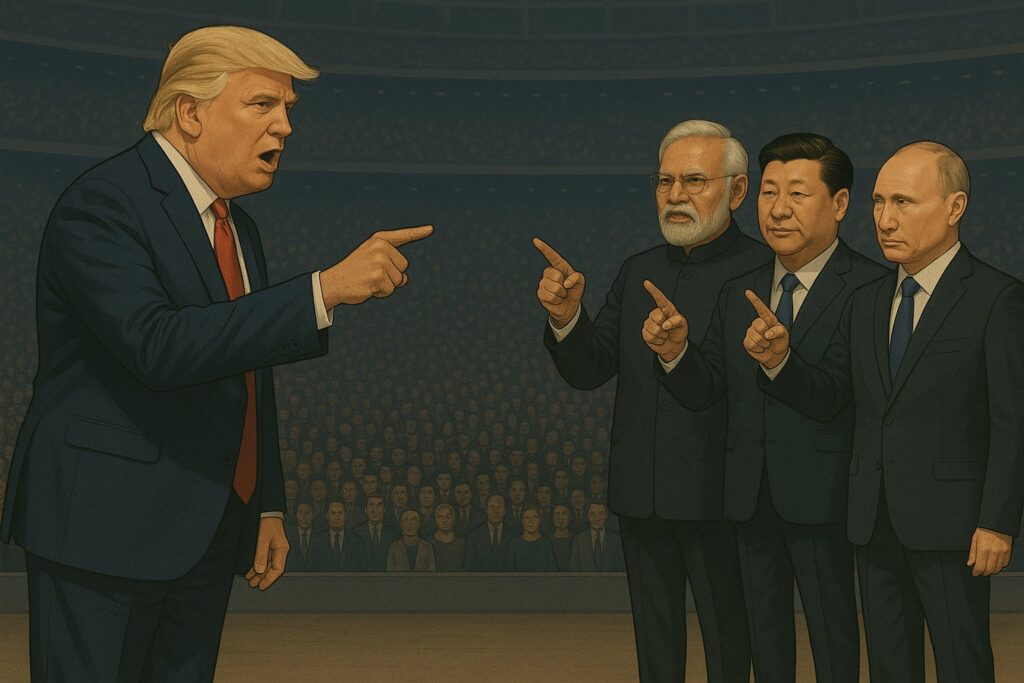
The current world economy is at a complex and interdependent stage. In particular, the U.S. policy of imposing tariffs is creating a crisis in global trade, which is affecting not only America but the entire world economy.
U.S. Tariffs: Damages and Limitations:-
The United States is trying to protect its domestic market through tariffs. Although trade disputes have begun with several countries including China and India, at present this policy has primarily turned into a trade war with India. The Trump administration is trying to push U.S. products into the Indian market, especially the dairy market, which has become a source of pressure for India. India’s dairy market is worth $45 billion, representing 20% of the world’s total. But India is unwilling to make concessions in this sector. Immediately after the U.S. raised tariffs, India suspended purchase orders worth $7 billion.
Although the U.S. has a $45 billion trade deficit with India, it is small compared to the total U.S. trade deficit of $800 billion. India has previously managed without the U.S. and remains only minimally dependent now. Due to the U.S.’s reliability issues and behavior, India is gradually distancing itself from this relationship. India is not interested in buying low-quality U.S. products, which worries the United States. Analysts believe that this conflict is not limited to India—America may in the future engage in similar tariff disputes with China as well.
Middle East, UAE, and Africa:-
Key Alternative Markets for India and China
Even if Europe and America are lost markets, the Middle East, Asia, Africa, and the United Arab Emirates have now become some of the most important alternative markets for India and China. The UAE’s geographic location, as a connecting point between Asia and Africa, has made it a trade hub. Since most African countries are economically developing and low-income, there is a huge demand for cheap goods, which India and China are successfully meeting.
Although political instability and international relations in the Middle East present limitations, the region and Africa hold vast long-term potential for India and China. If it chooses, India can buy more oil from Russia to easily offset the losses caused by U.S. tariffs. Trump’s measures could reduce India’s economic growth by only 0.02%, which is negligible.
A Strong Alliance, Potential of India, Russia, and China:-
In response to America’s consistent tariff policies and potential new trade wars, a powerful economic alliance could be an alternative. If India, Russia, and China come together to form an economic and political bloc, the balance of the global economy could change. They could create a massive trade market among themselves and launch a new currency, reducing the dominance of the dollar. This would diminish U.S. economic influence and bring changes in global politics.
If India develops alternatives to Google, YouTube, and Facebook, the U.S. will take a major hit, since India’s vast human resources are its key strength. On the other hand, if companies like Apple avoid the Indian market, survival will become difficult for them. The U.S. is already facing problems in agricultural products, as many countries are buying cheaper and higher-quality goods from Brazil and other sources, with even the European Union rejecting U.S. products for quality reasons.
Political and Military Risks of Tariffs:-
Tariffs are not only an economic weapon—they can also be a source of political tension. History shows that when a powerful country’s economic dominance declines, it may become involved in military conflicts. If the U.S., in an attempt to maintain its economic and political influence, suffers major losses, the possibility of a large-scale conflict on the world stage cannot be ruled out. Many analysts believe that such conflicts may not be driven by individual leaders but by the “deep state,” meaning that regardless of whether it is Trump or Biden in power, the core direction of policy will remain the same.
Conclusion:-
The world economy is changing rapidly. The U.S. policy of imposing tariffs may be a temporary shock, but its long-term effects could pose serious threats to global political and economic security. If India, Russia, China, and other developing countries unite to form a strong alliance, a new chapter in global trade will begin, and U.S. influence will significantly decline. The world must move toward a peaceful and balanced trade system—otherwise, the risk of a new kind of global conflict will remain.